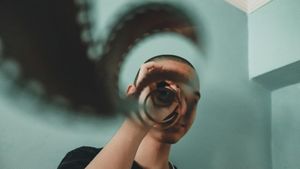Ukrainian refugees in the UK find themselves facing the dual challenge of adapting to life far from home and grappling with growing uncertainty about their future. Among them is Mariia, who fled her hometown as the conflict escalated after Russia invaded Ukraine. Now, after nearly three years, she expresses her fears of leaving the UK, feeling she has more to lose than to gain should she return.
Mariia, who previously worked at a British international school, fled Kyiv and initially moved back to her hometown after the war began. Unfortunately, the situation deteriorated, forcing her to leave for the UK. Since arriving, Mariia found work as a teaching assistant and now teaches English to other displaced Ukrainians. She reflects on her abrupt transition: “At first when I came here, of course, it seemed like it was just six months. But now it’s almost been three years. I’m scared to admit…but I have more to lose here than I have left there. Especially at this point in my life. I am 27. My career is growing.”
Her situation is emblematic of the experiences faced by many refugees who have sought safety and security far from their homes. The UK government initiated the Homes for Ukraine scheme soon after the invasion began, allowing residents to sponsor Ukrainian refugees. To date, it has received 352,000 applications and issued over 267,200 visas, according to government data.
Among the stories of resilience is Mariia’s harrowing escape from Ukraine, which she described as a nightmare: “It took about 20 hours overall on a coach to get to Krakow in Poland, then a flight from Krakow to London,” she said. “I live close to the border, and for people from other parts of the country, it can take three days to get anywhere.”
Despite the challenges, Mariia has been deeply moved by the support she’s found from British citizens. “The way this programme has worked and the way this country has supported Ukrainians is just hard to even get your head around,” she stated, expressing gratitude for the thousands who have opened their homes to refugees.
Another notable story is of the Zhyhunova family, who fled Ukraine and settled in Nottingham to be near relatives. They have gained some fame lately, featuring as winners in the annual Portrait of Britain awards. The family posed together for the photo, showcasing their traditional costumes. Liudmyla Zhyhunova expressed excitement over friends spotting their image on digital billboards across the UK: “It's so nice when someone in another city sends us messages saying, ‘We saw your picture.’”
The impact of their public exposure has been uplifting during challenging times. Liudmyla initially struggled to find work but has since improved her English and found employment at a city centre restaurant. She emphasizes the positives: “Nottingham is such a nice place... There are so many different and nice places to go and see nature.”
Photographer Ciaran Spencer, who took their portrait, noted the historical parallel, observing the similar plight of those displaced by war. “Sadly, I would say the circumstances are sort of the same,” he shared, recalling his past work capturing the experiences of elderly individuals displaced by World War II.
Both Mariia and Liudmyla’s stories powerfully articulate the complex emotions wrapped up in the experiences of refugees. Survivor's guilt weighs heavily on Mariia, who receives messages from friends still facing bombs and uncertainty back home. “It’s really scary,” she stated, reflecting on the crisis affecting so many lives.
While there are overwhelming challenges, both women showcase resilience and adaptation. The support from initiatives like Beam, which aids those facing homelessness and refugees, has been instrumental. Beam, active for seven years, has assisted over 5,000 people with housing and job placement. Mayor Sadiq Khan, who initially funded the organization, aims to tackle homelessness across London by 2030, emphasizing the need for partnership to build stability.
The diverging paths taken by Mariia and the Zhyhunova family spotlight the wider narrative of Ukrainian refugees who find themselves adjusting to life amid the realities of war and displacement. Each story resonates with the themes of survival, hope, and community support, illustrating the common humanity shared across borders.
Moving forward, it’s clear the road will remain difficult for many displaced Ukrainians. But with the aid of generous sponsors and communities like those found throughout the UK, the refugees continue to build new lives, demonstrating remarkable strength and resilience against the backdrop of their hardships.



